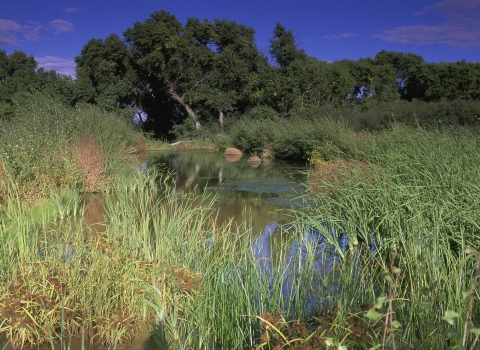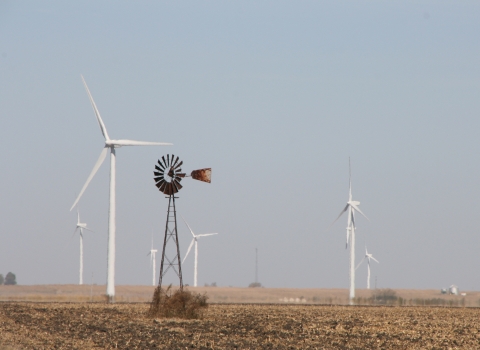Efforts to save a tiny snail and a charismatic shorebird highlight the accomplishments of the Great Lakes Regional winners of the U.S. Fish and Wildlife Service’s 2020 Recovery Champion Awards. We at the Service congratulate Tom Aley, Cathy Aley, Dr. Dave Ashley and Jack Dingledine for their dedication to saving imperiled species. The Aleys and Ashley were awarded for their work with the endangered Tumbling Creek cavesnail in Missouri, while Dingledine was recognized for his decades of commitment to recovery of the endangered Great Lakes piping plover in Michigan and other states.
The 2020 Recovery Champion award honors Service employees and partners for outstanding efforts to conserve and protect endangered and threatened species of fish, wildlife and plants. The Aleys, Ashley and Dingledine are among 16 individual and group champions, including U.S. Fish and Wildlife Service staff and their partners across the country, whose work is advancing the recovery of endangered and threatened species of plants and animals.
Tom Aley, Cathy Aley and Dr. Dave Ashley were recognized for their efforts to save the Tumbling Creek cavesnail, a tiny snail found only one cave system in Taney County, Missouri. The team has worked tirelessly to advance the conservation of the federally endangered snail through community engagement that instilled a sense of ownership of the species. The team's actions have also resulted in long-term recovery support for the species through the establishment of the Tumbling Creek Cave Foundation, which has protected and restored more than 3,500 acres of land within the recharge area of the cave since 2004. The foundation continues to advance restoration activities, conduct population surveys and monitoring, and control invasive species invasive species
An invasive species is any plant or animal that has spread or been introduced into a new area where they are, or could, cause harm to the environment, economy, or human, animal, or plant health. Their unwelcome presence can destroy ecosystems and cost millions of dollars.
Learn more about invasive species that threaten the snail's survival.
“The collaborative conservation success of this team’s efforts serves as a model for partners in Missouri and beyond,” said Charlie Wooley, the Service’s Great Lakes regional director. “Tom, Cathy and Dave will continue to guide and inspire future recovery efforts for imperiled species for years to come.”
The team’s efforts have resulted in a positive population trend since the Service emergency listed the snail in 2002. In 2017, the population estimate was 900 individuals, the highest since listing.
Jack Dingledine, recently retired from the Service’s Michigan Ecological Services Field Office, spent two decades working to stave off extinction of the Great Lakes piping plover. Numbers of this endangered shorebird were down to only 13 pairs in 1984. Dingledine helped to address threats to the species throughout the Great Lakes watershed through habitat management, nest protection, predator management and partner engagement. He helped develop and expand the captive rearing program to salvage abandoned and imperiled piping plover eggs. This Detroit Zoo program has raised and released nearly 300 captive piping plover chicks into the wild, including a record-breaking 39 chicks in 2020.
While the Great Lakes piping plover is still critically endangered, Dingledine’s efforts with the monitoring and protection, predator management, and captive rearing programs helped increase the population to a record high of 76 pairs in 2017, over halfway to the recovery goal of 150 pairs.
“The Great Lakes piping plover population has more than doubled throughout Jack’s exemplary career,” said Wooley. “Without his vision and determination for the piping plover recovery program, we would not be experiencing the recovery successes we are seeing today.”
Learn more about all the U.S. Fish and Wildlife Service 2020 Recovery Champions.

